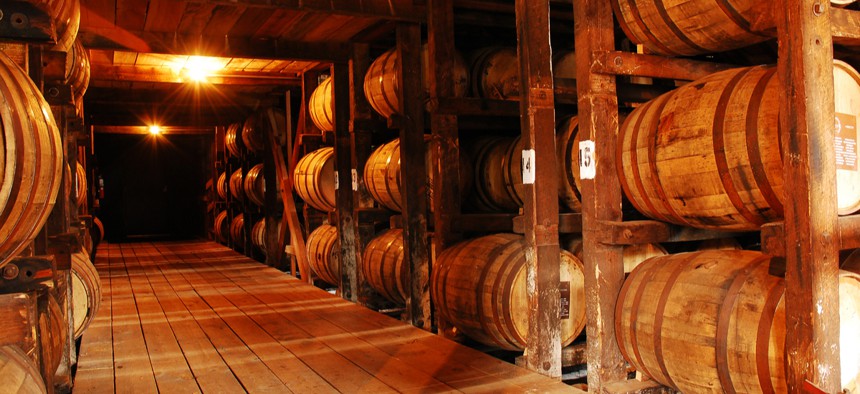Trump’s Trade War Could Stall Kentucky’s Bourbon-Fueled Boom

Shutterstock
An international tit-for-tat could have consequences for Kentucky and other regional economies.
President Trump’s announcement that the United States would impose tariffs on imported steel and aluminum could have wide-ranging impacts on a number of regional economies—including Kentucky’s economic darling: its bourbon industry.
U.S. allies that will be impacted by the steep tariffs on foreign steel and aluminum products said they would retaliate with tariffs on specific U.S. industries. This international trade war would likely have consequences for targeted domestic regional economies.
For instance, a Toronto-based trade lawyer mused about retaliation against American wines in The Washington Post. And, as several outlets reported, European Union President Jean-Claude Juncker has threatened to strike back at all-American products like Harley Davidsons and Kentucky bourbon.
For Kentucky, international retaliatory tariffs on its signature product could be damaging for a growing local economy.
“Bourbon is starting to grow out its international market,” Louisville Mayor Greg Fischer told Route Fifty in an interview. “It only has about 10 percent of the market share compared to scotch so it’s by no stretch of the imagination a fully developed market outside the United States so it’s a real opportunity for us.”
It’s not only an opportunity, but a major driver of the regional economy. In January 2017, the University of Louisville released a study estimating “the industry is responsible for between 15,000 and 17,500 jobs in the state, annual payroll of nearly $800 million, and total economic output of $8.5 billion.” It also pointed out that 2,000 jobs were added in the last 2 years alone, and was “responsible for $190 million in Kentucky state and local government revenues” in 2016.
“Bourbonism, which is bourbon tourism and our local food tourism, is a super-hot area for our city right now,” Fischer said. “We’ve got a strong American base for it but we need that international base as well, so I hope the White House kind of thinks more fully about some of the trade issues that were suggested the other day.”
In our interview, Fischer pointed to 25 hotels across his city either in the planning or construction phase as evidence of the city’s tremendous tourism growth. In his state of the city address in January, Fischer touted his city as the trailhead for Kentucky’s Bourbon Trail, ticking off myriad new tasting rooms and distilleries. He credited the boom with establishing Louisville as “a 365-day-a-year tourist destination, welcoming over 24 million tourist visits a year.”
Brian Roy, the executive director and CEO of the Kentucky Association of Counties, told Route Fifty in an interview that the industry has a “ripple effect” throughout the state, creating jobs well beyond tourism, from building staves for the millions of barrels of whiskey in Kentucky to warehousing of a liquor that is typically aged for years before being ready for consumption. He also pointed to regional farmers as an area that could be impacted.
“I know a lot of farmers have produced more corn than in other years due to the fact that that industry demands corn product,” Roy said.
All of it adds to employment—and the tax base. Roy told Route Fifty the bourbon itself is probably the most significant source of tax revenue for state and local governments, and “to have anything threaten those [revenues] would be very devastating.”
The University of Louisville’s report estimates that if the growth of the industry in Kentucky continues unencumbered, by 2020 state and local tax revenues will rise to $242 million.
Beyond the jobs and revenue for the region, their calling card is bourbon.
At the National Association of Counties meeting in Washington, D.C. this weekend, Boone County, Kentucky Judge Gary Moore has been handing out chocolate bourbon balls as favors in his bid to become second vice president of the organization. He mentioned the re-creation of Boone Distillery in his county has been “amazing,” not only for its tourism and jobs but “really selling our Kentucky heritage of bourbon.”
“Those industries that really brand Kentucky are so important to us,” Moore said, explaining that the industry is enticing when courting other large businesses to the state.
Like bourbon, tariff responses are as much symbolic as they are economic. Therefore, it’s not a coincidence that the European Union is targeting U.S. Senate Majority Leader Mitch McConnell’s home state.
As Gov. Matt Bevin stated last year, “with 95 percent of the world’s bourbon made in Kentucky, our spirits industry is a large and rapidly growing contributor to our economy each year.”
That would make a potential tariff on bourbon a very targeted—and very political—statement by the European Union.
Mitch Herckis is Senior Director of Programs at Government Executive’s Route Fifty and is based in Washington, D.C.
NEXT STORY: Georgia Lt. Gov. Jeopardizes His State’s Business-Friendly Reputation






